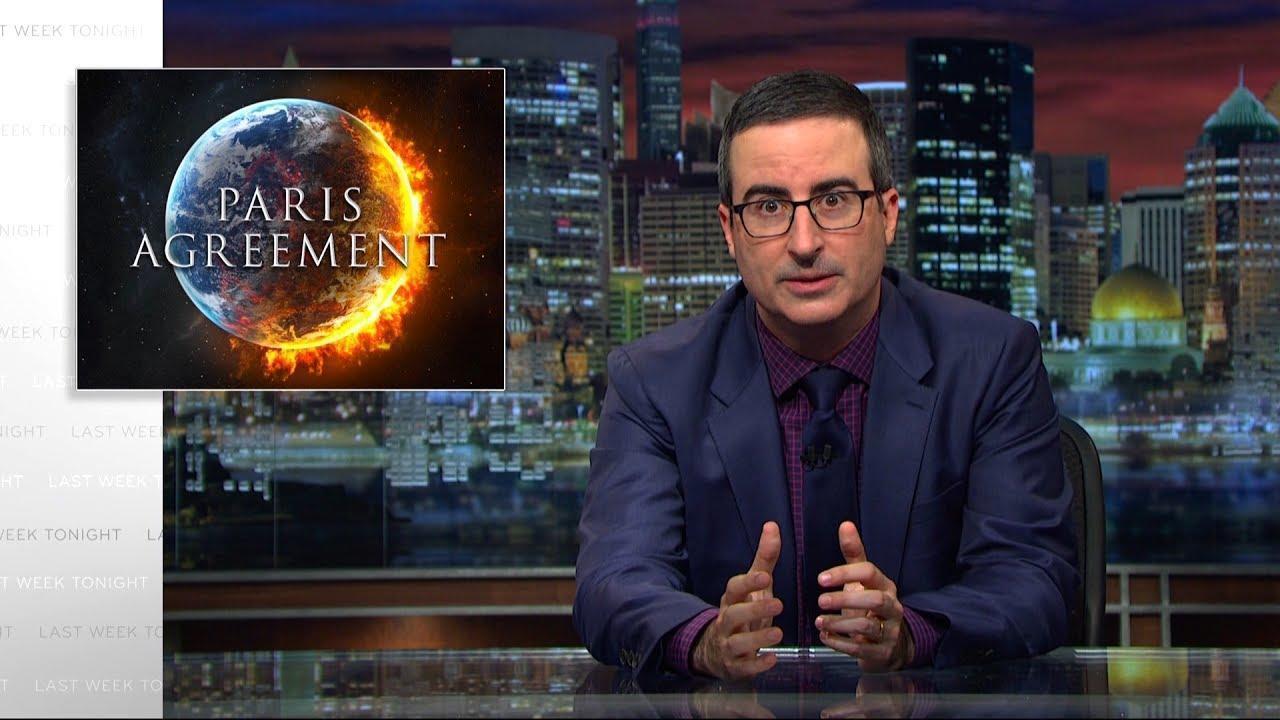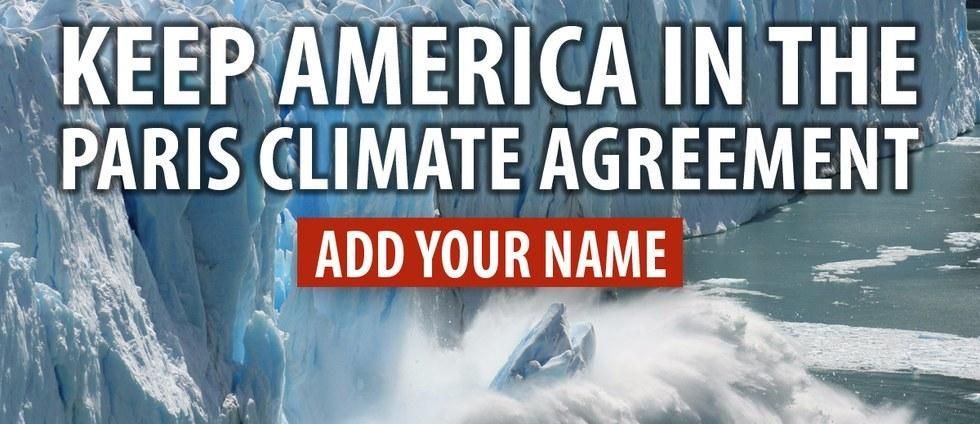
8 Hilarious John Oliver Rants Blasting Trump on Quitting Paris Agreement

By Joe McCarthy
A shred of silver lining from Donald Trump’s abandonment of the Paris agreement is that now the world has a John Oliver rant on climate change.
Like his segments on medical debt, Brexit and health care, this latest episode is bracing, hilarious and informative.
Oliver explains the agreement, skewers the rationale for leaving it and gives a good description of the threat of climate change.
Here are eight essential takeaways from the episode:
1. The Paris Agreement Was Voluntary
Trump said that he left the agreement because it was too demanding. In reality, it was entirely voluntary—there was no enforcement mechanism. Each country determined its own goals and was expected—but not required–to hit those goals.
“[This is] Trump’s most ludicrous misunderstanding of the agreement … for a man who cites the agreement’s strict, onerous and draconian terms,” Oliver said. “What he does not seem to comprehend, is each nation sets its own goals, remember, and more importantly, the whole thing is fucking voluntary.”
2. The Agreement Wasn’t Overly Burdensome on the U.S.
When Trump announced that he was withdrawing from the Paris agreement, he said it was because it required the U.S. to close down job-creating industries like coal, while other countries were allowed to expand those industries.
“India will be allowed to double its coal production by 2020,” Trump said during his announcement. “We’re supposed to get rid of ours.”
Oliver noted that the agreement doesn’t even mention coal and places no mandate on the U.S. to close any factories—or do anything for that matter. Trump may have been thinking about the Obama-era U.S. regulation known as the Clean Power Plan, which would have retired many coal plants because of high emissions. This regulation was never even implemented and is now being dismantled by the EPA’s new director Scott Pruitt.
“Trump’s description is so flamboyantly deceptive,” Oliver said. “It would have been equally accurate for him to say compliance with the Paris agreement would likely require all ducks to wear jean shorts and it would cost each American five fish and a dumptruck full of hamsters.”
3. The U.S. Economy Would Thrive Under Paris Agreement
“If the agreement was a scheme to hurt American businesses, you know who that might be news to?” Oliver asked. “The American businesses.”
More than 650 companies have committed to the Paris Agreement, more than half of the fortune 500 companies have plans to reduce their emissions—including Walmart, Bank of America and Phillip Morris—and 25 massive companies such as Microsoft and Intel even made a last-ditch effort to change the president’s mind by taking out advertisements supporting the agreement.
The Paris agreement aims to get countries to switch to renewable energy. Far from crippling the U.S. economy, renewable energy can be an engine of prosperity. Already, the renewable industry is hiring people at 12 times the rate of the rest of the economy. As advances in technology are made and prices go down, even more economic growth will follow.
China gets this. The country that Trump often casts as a nemesis, is investing $360 billion into renewables by 2020, which will create 13 million jobs.
4. Leaving the Agreement Hurts U.S. Reputation
The Paris agreement was a monumental global achievement that took years of work and marked a pinnacle of science and diplomacy.
Trump spurned all of that by leaving.
“Pulling out of Paris would be the worst thing for brand America since Abu Ghraib,” Nigel Purvis, an environmental negotiator in the Clinton and George W. Bush administrations told The New York Times.
The Vatican said: “If he really does [pull out], it would be a huge slap in the face for us,” a Vatican spokesman said before Trump’s announcement, according to Reuters. “It will be a disaster for everyone.”
5. The Green Climate Fund Doesn’t Burden the U.S.
The Green Climate Fund is a fund set up to help poor countries adapt to climate change and transition to renewable economies, leapfrogging fossil fuel-intensive industries.
Trump portrayed the fund as a burden that would cost the U.S. tens of billions of dollars. In fact, the U.S. committed $3 billion to the fund, and has so far committed $1 billion.
“If you rank contributions as a percentage of GDP, we are 32nd,” Oliver pointed out.
6. The U.S. has a Unique Responsibility to Help
The U.S. is the bigger emitter in history and the average U.S. citizens is responsible for far more emissions than the average citizen anywhere else in the world.
Because the U.S. is largely responsible for the current climate crisis, it has a responsibility to find a solution.
7. Time Is Running Out
The Paris agreement declared that global temperatures should not rise more than two degrees Celsius above pre-industrial levels. For that to happen, emissions have to be dramatically curbed right away. But if business as usual continues, then the world will blow past that threshold point in as little as 20 years.
And if that happens, “Things get very bad and potentially irreversible,” Oliver said.
By leaving the agreement, Trump makes it much harder to stay under the two-degree ceiling.
8. The Silver Lining: Political Action
In the aftermath of Trump’s withdrawal, an unnamed group led by former New York mayor Michael Bloomberg of at least 30 mayors, three governors, 80 university presidents, and more than 100 businesses are going to spearhead a movement to uphold the Paris agreement.
For Oliver, that’s where the path forward lies—political action.
“The problem with climate change is it’s always felt abstract impersonal, and far off into the future, and the usual [examples] that we use don’t do much to fix or help,” Oliver said. “It’s either a graph that’s difficult to understand, or a sad polar bear on a piece of ice, and it’s hard to get get emotionally fired up over that.”
“But finally, this week, the climate change movement may have gotten a symbol to rally around,” he said.
To that end, Oliver called on his viewers to find out where their local, state, and federal representatives stand on climate change. If those legislators doubt the science and oppose action, then Oliver called on his fans to organize, rally and unseat them in the election.
There’s no time to waste.

 233k
233k  41k
41k  Subscribe
Subscribe 
